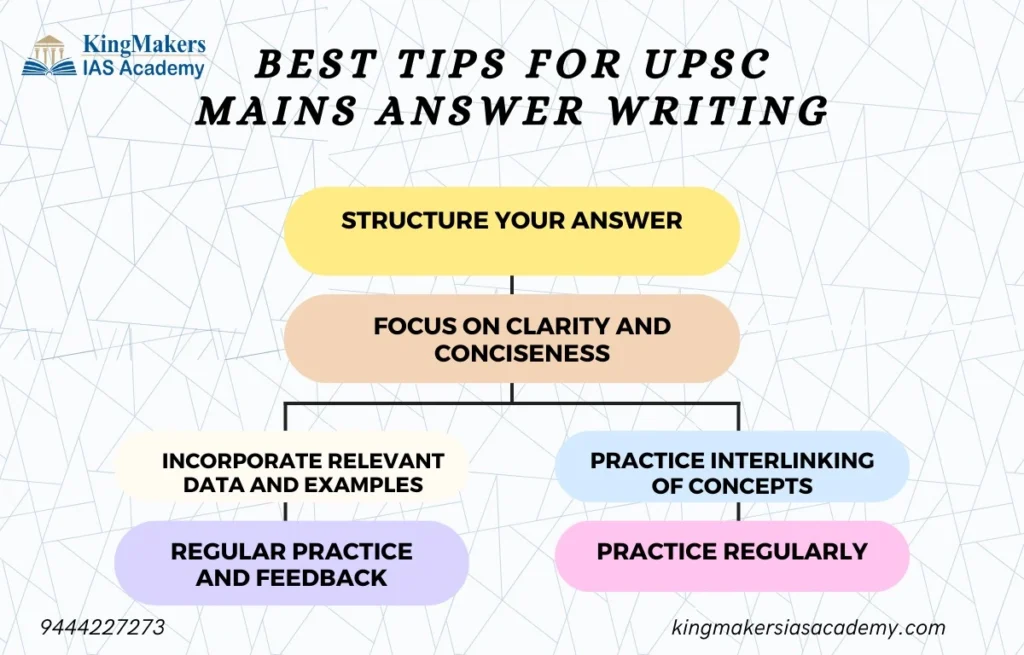The UPSC examination is one of the most challenging competitive exams in our country. Clearing it requires a comprehensive understanding of various subjects, and excellent answer writing skills besides answer writing tips for UPSC Mains, especially for the Mains examination.

Top 15 Answer Writing Tips For UPSC Mains
Here are some of the best answer writing techniques UPSC Mains to enhance your UPSC Mains answer writing abilities.
Understand the Syllabus and Exam Pattern
Before diving into answer writing, thoroughly understanding the UPSC syllabus and exam pattern is crucial. The main examination consists of nine papers, including four General Studies (GS) papers, two optional subject papers, an essay paper, and two language papers. Each paper has a distinct pattern and requirements. The best answer writing tips for UPSC is to familiarize yourself with the specific demands of each paper to tailor your answers accordingly.
Read the Questions Carefully
Reading and interpreting the question accurately is the first step in writing a good answer. Pay close attention to directive words like ‘discuss,’ ‘analyze,’ ‘critically evaluate,’ and ‘comment.’ These words dictate the structure and depth of your answer. Misinterpreting the question can lead to an off-topic answer, which can severely impact your scores.
Develop a Structured Approach
A well-structured answer is crucial for scoring high marks. Typically, effective answers for UPSC Mains should consist of an introduction, body, and conclusion. Utilizing answer writing tips for UPSC Mains ensures that your response is organized and comprehensive.
- Introduction: Start with a concise introduction that sets the context. You can define key terms, provide background information, or state the significance of the topic.
- Body: This is where you present your main arguments, supported by facts, examples, and analysis. Break down the content into clear, concise paragraphs, each addressing a specific aspect of the question.
- Conclusion: Conclude with a summary of your main points or a thoughtful insight that ties everything together. Ensure that your conclusion is in line with the discussion in the body of the answer.
Focus on Clarity and Coherence
Clarity and coherence are essential for effective communication. Avoiding jargon and overly complex language is one of the major answer-writing tips for UPSC Mains. Write in simple, grammatically correct sentences. Ensure that each paragraph flows logically from the previous one, maintaining a clear narrative throughout your answer.
Use Diagrams, Flowcharts, and Bullet Points
Visual aids like diagrams, flowcharts, and bullet points can enhance the readability of your answer and help convey complex information more effectively. UPSC answer writing tricks are judiciously used to illustrate key points, show relationships, or summarize data. However, make sure they are neat, labeled, and relevant to the content.
Time Management
Time management is crucial while considering the answer writing tips for UPSC Mains. You need to balance the quality of your answers with the quantity. Practice writing answers within a set time frame to improve your speed and efficiency. Allocate time wisely to each question, ensuring that you have enough time to attempt all questions in the paper.
Practice Answer Writing Regularly
Regular practice is key to mastering answer writing techniques UPSC Mains. Join a test series to get regular feedback on your answers. Write at least one full-length test every week in exam-like conditions. Analyze your performance critically and work on the feedback to improve continuously.
Enrich Your Answers with Relevant Examples and Case Studies
Incorporating relevant examples, case studies, and contemporary issues can make your answers stand out. For instance, citing recent government initiatives or international agreements can add value to a question related to environmental issues. While considering best answer writing tips for UPSC, use examples from current affairs, history, geography, and other subjects to substantiate your arguments.
Integrate Multiple Perspectives
UPSC values well-rounded answers that consider multiple perspectives. While answering questions, try to integrate economic, social, political, and environmental viewpoints. This answer writing tips for UPSC Mains not only enrich your answer but also demonstrate a holistic understanding of the topic.
Work on Your Presentation
The presentation of your answers can significantly impact your scores. Write legibly and maintain a clean layout. Use headings and subheadings to organize your answer while taking into consideration the UPSC answer writing tips. Highlight key points using underlining or different color pens, but avoid overdoing it. Margins and proper spacing can also enhance the overall presentation.
Stay Updated with Current Affairs
Current affairs play a crucial role in UPSC Mains. Regularly read newspapers, follow credible news sources, and make notes of important events and issues. Integrate current affairs into your answers to show awareness of recent developments and their relevance to the topic.
Develop a Strong Introduction and Conclusion
The introduction and conclusion are critical components of your UPSC answer writing tricks. A strong introduction can capture the examiner’s attention, while a well-crafted conclusion can leave a lasting impression. Spend time crafting these sections carefully. Your introduction should be precise and to the point, while the conclusion should succinctly summarize your main arguments and provide a closing thought.
Revise and Edit
Revision and editing are essential steps when answer writing tips for UPSC Mains are considered. After writing the answer, take a few minutes to review it. Check for any grammatical errors, clarity issues, or gaps in your argument. Editing can help refine your answer and ensure it is error-free.
Use Quotations and Data Wisely
Incorporating relevant quotations from eminent personalities, reports, and data from credible sources can add weight to your arguments. Ensure that the quotes and data are accurate and relevant to the question. While considering the UPSC answer writing tips, overuse of quotations and data can clutter your answer, so use them judiciously.
Stay Calm and Composed
Examination pressure can lead to stress and anxiety, which can negatively impact your performance. Practice relaxation techniques like deep breathing, meditation, or light physical exercise to stay calm and composed. A clear and focused mind will help you think more clearly and write better answers.
Do’s and Don’ts
| Aspect | Do’s | Don’ts |
| Understanding the Question | -Read the question carefully. -Understand keywords like ‘analyze,’ ‘critically evaluate,’ etc. | -Don’t misinterpret the question. -Avoid skipping parts of a multi-dimensional question. |
| Structure | -Follow a clear structure: Introduction, Body, and Conclusion. -Use headings and subheadings. | -Don’t write in a cluttered or disorganized manner. |
| Content | -Use relevant facts, examples, and data. -Incorporate current affairs and case studies. | -Don’t include irrelevant information or go off-topic. |
| Presentation | – Write in legible and neat handwriting. – Highlight key points using underlining or boxes. | -Don’t overuse underlining or make your answer too decorative. |
| Language | – Use simple, precise, and formal language. | – Avoid grammatical errors, flowery language, or overly complex sentences. |
| Time Management | -Allocate time wisely per question. -Move on if stuck, and revisit later if time allows. | -Don’t spend excessive time on one question. |
| Word Limit | -Stick to the prescribed word limit. -Be concise and avoid unnecessary elaboration. | -Don’t exceed the word limit significantly. |
| Analysis | – Present balanced arguments. – Provide critical insights and your own perspective. | -Don’t just summarize content without analysis or write biased opinions. |
| Diagrams and Charts | -Use diagrams, flowcharts, and tables wherever appropriate. | -Don’t use them unnecessarily or make them unclear and untidy. |
| Quoting Sources | -Mention credible sources like NITI Aayog reports, government schemes, etc. | -Don’t quote outdated or unreliable sources. |
Conclusion
To conclude, mastering the art of answer writing tips for UPSC Mains requires a blend of knowledge, practice, and strategy. Understanding the syllabus and exam pattern, interpreting questions correctly, structuring your answers well, and presenting them neatly are crucial steps. Regular practice, incorporating current affairs, and staying calm under pressure are equally important. By following these tips, you can enhance your answer writing skills and increase your chances of success in the UPSC Mains examination.
Check Out More: Mistakes to Avoid in UPSC Preparation.



